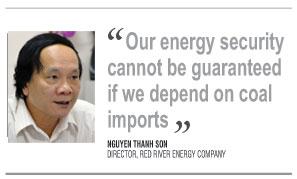Coal exports make no sense
Published: 26/06/2011 05:00
Vietnam imported its first load of coal this month even as it continues exporting large quantities of the fuel. This is irrational and the country should have stopped exporting it years ago, Nguyen Thanh Son, director of the Red River Energy Company, tells Thanh Nien Weekly. Thanh Nien Weekly: Vietnam has begun importing coal. What are the implications of this move? Nguyen Thanh Son: It is a sign of imbalance in coal supply and demand. The coal shortage for energy needs has already happened. It should not have happened this soon. We may have been too subjective (in our decision making) and our management in the coal industry has been wrong. We are now exporting coal while needing to import it. We could soon face the situation of a shortage of coal, what we are actively exporting now, for electricity generation. Twenty years ago, we sold, at a very low price, a mine in Quang Ninh Province to Indonesia with reserves of 20 million tons. It has annually tapped from the mine over 600,000 tons of coal. Now, we have to import from Indonesia coal of much lower quality. The quality of the coal we import is half of what we export. This is unacceptable. We are exporting coal to China, which uses our coal for electricity generation, and then sells electricity to Vietnam at a high price. Every year, we purchase some 4-5 billion kilowatt-hours of electricity from China, while exporting some 10 million tons of coal to the country. The coal we export now will be needed for our own electricity generation in the future. Thus, this coal export is irrational and unacceptable. In our country, thermal power price is still very low, at about four cents per kWh, so coal is not used for electricity production (because of low economic effectiveness). Thus, the Vietnam National Coal, Mineral Industries Holding Corporation (Vinacomin) must export the fuel (to earn higher profits). According to the coal industry development plan approved in 2003, we should be exporting some 2.5 million tons of coal every year. However, the industry has raised its output to boast a better work performance. Most of the coal output, in recent years, has been exported, not used to meet domestic demand. The domestic demand now is similar to that specified in the 2003 development plan. We are exporting primary energy sources such as coal and oil, and importing secondary energy like electricity. This is an unacceptable shortcoming. Are you saying that the shortcomings have been foreseen and the industry should have stopped exporting years ago?
Right. However, the coal industry could not stop exporting because it was based on better performance. Its output increased every year while domestic demand did not rise accordingly, so it had to export it. Moreover, our coal production cost is too high and the selling price in the domestic market could not keep up with that. Thus, profit from coal sales in the domestic market is very thin. Due to bad production management, coal production cost in Vietnam now is among the highest in the world at some VND1 million (US$50) per ton. At current selling prices in the domestic market, the industry’s annual profit would be very low, at VND5-7 trillion, inadequate to meet capital needed for reinvestment. The industry needs some $1 billion of reinvestment capital each year. Thus, it has to continue to export coal to earn profits and expand production. What it should have done is to earn bigger profits by cutting production costs. However, no one paid attention to it. The industry focused solely on tapping coal for export, and we are caught in this situation now. How can we balance export and import? We should fundamentally restructure the coal industry. The industry’s production organization and cadre management is no longer suitable in the current context. As for long-term balance, coal import is an issue that is tough to settle. Our energy security cannot be guaranteed if we depend on coal imports. What if the exporters stop exporting? Furthermore, we could not compete with other countries in coal imports. The Asia-Pacific region is expected to be one of the biggest coal importers in the future. China is expected to annually import some 1.6 billion tons of coal by 2030. With the import of 100 million tons of coal each year, how can we compete? Japan also imports some 200 million tons of coal each year. With much more advanced technology, it can now use one kilogram of coal to generate four kWh of electricity, while we can only produce two kWh. Thus, we cannot compete with them to buy coal at high prices from Australia or Indonesia. So it’s wrong to think that we can import coal to guarantee national energy security. Countries will cut their coal exports when seeing their mineral resources are being exhausted. Countries such as China and Japan have begun importing coal decades ago. While we have just imported the first load, it is just 9,570 tons of bad coal. So, it is difficult for us to compete. Vinacomin explains that it exports high-quality coal, which we do not have demand for, and imports low-quality coal. Thus, this could be more efficient, economically. This is duplicitous. Up to 80 percent of Vinacomin’s exports are of low-quality coal that China purchases for electricity generation. What is the real potential of Vietnam’s coal mines? Our coal potential is forecast to be very great, but the actual supplies in the mines that have already been explored are very small. For example, the potential coal reserves in Quang Ninh Province could be 10 billion tons, and in the Red River Delta, 210 billion tons. However, the explorable reserves in Quang Ninh so far are estimated at just two billion tons, and for the Red River Delta, just 200 million tons. In the current situation, Vietnam is one of countries with the smallest coal reserves available for mining. The world has reserves of some 900 billion tons, while Vietnam has little more than two billion tons.
Reported by Bao Van |
Provide by Vietnam Travel
Coal exports make no sense - Reports - In depth | vietnam travel company
You can see more
- Young people who change Vietnam’s art
- A Vietnamese village without using money
- Legging it through Vietnam
- Top 10 remarkable Vietnam tourism events 2012
- Filipino teacher’s accusations in Vietnam
- Getting married foreign men for filial duty
- A mine collapsed with 16 death people in Vietnam
- The taco sultan of Ho Chi Minh City
enews & updates
Sign up to receive breaking news as well as receive other site updates!
- Banh Đa Cua - a traditional Hai Phong specialty
- Exploring Lai Chau cuisine
- Hanoi ranked top 3 cuisine in the world in 2023
- Beautiful resorts for a weekend escape close to Hanoi
- Travel trends in 2023
- In the spring, Moc Chau is covered in plum blossoms.
- The Most Wonderful Destinations In Sapa
- Top 3 Special festivals in Vietnam during Tet holiday - 2023
- 5 tourist hotspots expected to see a spike in visitors during Lunar New Year 2023
- How To Make Kitchen Cleaned
-
vietnam travel
http://www.vietnamtourism.org.vn " Vietnam Tourism: Vietnam Travel Guide, Culture, Travel, Entertainment, Guide, News, and...
-
Vietnam culture, culture travel
http://travel.org.vn " Vietnam culture
-
Vietnam travel, vietnam travel news, vietnam in photos
http://www.nccorp.vn " Vietnam travel, vietnam travel news, vietnam in photos
-
Vietnam tourism
http://www.vietnamtourism.org.vn " The official online information on culture, travel, entertainment, and including facts, maps,...
-
Vietnam Travel and Tourism
http://www.vietnamtourism.org.vn/ " Vietnam Travel, Entertainment, People, Agents, Company, Vietnam Tourism information.
-
Information travel online
http://www.travellive.org "Information travel online














